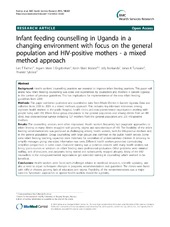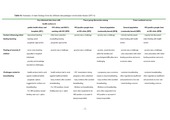| dc.contributor.author | Fadnes, Lars Thore | en_US |
| dc.contributor.author | Engebretsen, Ingunn Marie S. | en_US |
| dc.contributor.author | Moland, Karen Marie | en_US |
| dc.contributor.author | Nankunda, Jolly | en_US |
| dc.contributor.author | Tumwine, James K. | en_US |
| dc.contributor.author | Tylleskär, Thorkild | en_US |
| dc.date.accessioned | 2011-04-14T08:04:36Z | |
| dc.date.available | 2011-04-14T08:04:36Z | |
| dc.date.issued | 2010-09-06 | eng |
| dc.Published | BMC Health Services Research 10(260) | en_US |
| dc.identifier.issn | 1472-6963 | |
| dc.identifier.uri | https://hdl.handle.net/1956/4661 | |
| dc.description.abstract | Background Health workers' counselling practices are essential to improve infant feeding practices. This paper will assess how infant feeding counselling was done and experienced by counsellors and mothers in Eastern Uganda in the context of previous guidelines. This has implications for implementation of the new infant feeding guidelines from 2009. Methods This paper combines qualitative and quantitative data from Mbale District in Eastern Uganda. Data was collected from 2003 to 2005 in a mixed methods approach. This includes: key-informant interviews among eighteen health workers in the public hospital, health clinics and non-governmental organisations working with people living with HIV, fifteen focus group discussions in the general population and among clients from an HIV clinic, two cross-sectional surveys including 727 mothers from the general population and 235 HIV-positive mothers. Results The counselling sessions were often improvised. Health workers frequently had pragmatic approaches to infant feeding as many clients struggled with poverty, stigma and non-disclosure of HIV. The feasibility of the infant feeding recommendations was perceived as challenging among health workers, both for HIV-positive mothers and in the general population. Group counselling with large groups was common in the public health service. Some extra infant feeding teaching capacities were mobilised for care-takers of undernourished children. A tendency to simplify messages giving one-sided information was seen. Different health workers presented contradicting simplified perspectives in some cases. Outdated training was a common concern with many health workers not being given courses or seminars on infant feeding since professional graduation. Other problems were minimal staffing, lack of resources, and programs being started and subsequently stopped abruptly. Many of the HIV-counsellors in the non-governmental organisations got extended training in counselling which seemed to be beneficial. Conclusions Health workers were faced with challenges related to workload, resources, scientific updating, and also a need to adjust to frequent changes in programs, recommendations and guidelines. The clients were faced with difficult choices, poverty, lack of education and stigma. Feasibility of the recommendations was a major concern. Systematic approaches to update health workers should be a priority. | en_US |
| dc.language.iso | eng | eng |
| dc.publisher | BioMed Central | eng |
| dc.rights | Attribution CC BY | eng |
| dc.rights.uri | http://creativecommons.org/licenses/by/2.0 | eng |
| dc.title | Infant feeding counselling in Uganda in a changing environment with focus on the general population and HIV-positive mothers - a mixed method approach | en_US |
| dc.type | Peer reviewed | |
| dc.type | Journal article | |
| dc.description.version | publishedVersion | en_US |
| dc.rights.holder | Copyright 2010 Fadnes et al; licensee BioMed Central Ltd. | |
| dc.rights.holder | Fadnes et al. | |
| dc.identifier.doi | https://doi.org/10.1186/1472-6963-10-260 | |
| dc.identifier.cristin | 338606 | |


